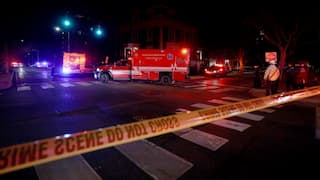Cyclone Asani: First Of 2022 To Hit By March 21, Likely To Hit Coasts Of Andaman and Nicobar
The IMD has warned of likely heavy rain (64 to 115 mm in 24 hours) over the Nicobar Islands with isolated, very heavy spells (115 to 204 mm in 24 hours) on Friday.

New Delhi: The India Meteorological Department on Thursday said that the year's first cyclone will develop around March 21 in the Bay of Bengal. Cyclones usually form in the months ahead of monsoon over the north Indian Ocean between April and May.
March is not a cyclonic season as the ocean is cooler and the solar solution is not very high. According to IMD’s experimental pre-genesis intensity forecast and wind distribution track, the low-pressure area (LPA) over Southeast Bay of Bengal is likely to intensify into a depression on March 20 and cyclone Asani on March 21.
ALSO READ: 'Amrit Kaal' Gives Us Opportunity To Work Towards Strong, Developed & Inclusive India: PM Modi
The cyclone will be given the name 'Asani', a name given by Sri Lanka. The cyclone is not likely to hit mainland India, however, it may affect Andaman and Nicobar Islands, Bangladesh, north Myanmar. When the cyclone moves past Andaman and Nicobar Islands it will bring heavy rainfall on March 20 and 21.
The IMD has warned of likely heavy rain (64 to 115 mm in 24 hours) over the Nicobar Islands with isolated, very heavy spells (115 to 204 mm in 24 hours) on Friday.
Fishermen have been advised not to venture into the sea between March 17 to 22. A suspension of offshore activities has been advised for March 20 and 22. Air traffic also needs to be regulated on March 20 and 21, IMD said.
“The system will further move east-northeast wards and strengthen to become a well-marked low-pressure system adjoining the Andaman Sea by Saturday morning. Further intensification into a depression and movement along the Andaman and Nicobar islands is expected on March 20 and 21,” the department’s special bulletin said.
Meteorologist Akshay Deoras tweeted that if the forecast materializes this would the first cyclone to hit Andaman and Nicobar Island in 132 years.






































